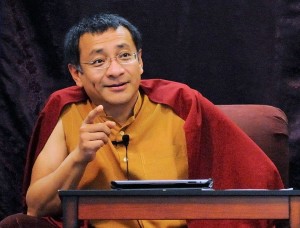
Dzogchen Ponlop Rinpoche: Born to be Free
Rebel Buddha is an exploration of what it means to be free and how it is that we can become free. Although we may vote for the head of our government, marry for love, and worship the divine or mundane powers of our choice, most of us don’t really feel free in our day-to-day lives. When we talk about freedom, we’re also talking about its opposite—bondage, lack of independence, being subject to the control of something or someone outside ourselves. No one likes it, and when we find ourselves in that situation, we quickly start trying to figure out a way around it. Any restriction on our “life, liberty, and pursuit of happiness” arouses fierce resistance. When our happiness and freedom are at stake, we become capable of transforming ourselves into rebels.
There’s something of a rebellious streak in all of us. Usually it’s dormant, but sometimes it’s provoked into expression. If nurtured and guided with wisdom and compassion, it can be a positive force that frees us from fear and ignorance. If it manifests neurotically, however, full of resentment, anger, and self-interest, then it can turn into a destructive force that harms oneself as much as it does others. When confronted with a threat to our freedom or independence and that rebellious streak surfaces, we can choose how to react and channel that energy. It can become part of a contemplative process that leads to insight. Sometimes that insight comes quickly, but it can also take years.
According to the Buddha, our freedom is never in question. We are born free. The true nature of the mind is enlightened wisdom and compassion. Our minds are always brilliantly awake and aware. Nevertheless, we’re often plagued by painful thoughts and the emotional unrest that goes with them. We live in states of confusion and fear from which we see no escape. Our problem is that we don’t see who we truly are at the deepest level. We don’t recognize the power of our enlightened nature. We trust the reality we see before our eyes and accept its validity until something comes along—an illness, accident, or disappointment—to disillusion us. Then we might be ready to question our beliefs and start searching for a more meaningful and lasting truth. Once we take that step, we’re starting off on the road to freedom.
On this road, what we free ourselves from is illusion, and what frees us from illusion is the discovery of truth. To make that discovery, we need to enlist the powerful intelligence of our own awake mind and turn it toward our goal of exposing, opposing, and overcoming deception. That is the essence and mission of “rebel buddha”: to free us from the illusions we create by ourselves, about ourselves, and those that masquerade as reality in our cultural and religious institutions.
We start by looking at the dramas in our life, not with our ordinary eyes, but with the eyes of dharma. What is drama and what is dharma? I guess you could say drama is illusion that acts like truth, and dharma is truth itself—the way things are, the basic state of reality that does not change from day to day according to fashion or one’s mood or agenda. To change dharma into drama, all you need are the elements of any good play: emotion, conflict, and action—a sense that something urgent and meaningful is happening to the characters involved. Our personal dramas may begin with the ‘facts’ about who we are and what we are doing, but, fueled by our emotions and concepts, they can quickly evolve into pure imagination and become as difficult to decipher as the storylines of our dreams. Then our sense of reality becomes further and further removed from basic reality itself. We lose track of who we really are. We have no means of telling fact from fiction, or developing the self-knowledge or wisdom that can free us from our illusions.